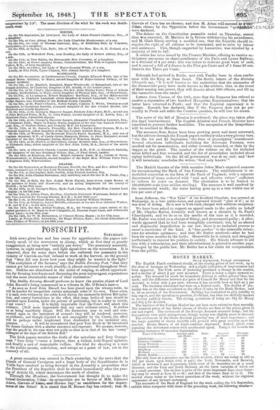POSTSCRIPT.
SATURDAY.
Irish news gives less and less cause for apprehension: the papers uni- formly speak of the movement at Aheny, which at first they so grossly exaggerated, as being now "entirely put down." The peasantry assemble, however, in night meetings, and light signal-fires on the mountains. It is observed, that for some days before the outbreak the peasantry in the vicinity of Carrick-on-Suir refused to work at the harvest, on the ground that "they did not know how soon they might be wanted in the fight." "The complaint of the farmers," says the Dublin Evening Post, "that they cannot get labourers to work steadily, is almost universal throughout Mun- ster. Sickles are abandoned in the midst of reaping, to afford opportuni- ties for forming into knots and discussing the most extravagant expectations and the most abominable means of their realization."
The Dublin Evening Herold professes to know the precise object of Lord John Russell's being summoned as a witness in Mr. O'Brien's ease— "As soon as Lord John Russell has been placed upon the witness-table, he will be handed for recognition certain autograph notes of his own. These notes, it is said, were written by the noble Lord during the memorable Reform Bill agita- tion; and convey instructions to the effect that large bodies of men should be marched upon London, under the pretext of petitioning, but in reality to terrify, if not worse! . . . It is highly improbable that the Court will admit this evidence. [Still more improbable that any such evidence exists.] It strikes us as being manifestly illegal. Still the documents may be read and com- mented upon in the statement of counsel: they will be tendered, moreover, as evidence; and though objected to and successfully by the Crown, the effect Willbe perhaps rather heightened than diminished by the technical sup- pression. . . . It will be remembered that poor Tom Steele in '48 threatened Sir James Graham with a similar summons and exposure. We assume, however, that the proofs in his case were not quite so clear as in that of his less ' canny ' colleague of the days of the Reform Bill."
The Irish papers mention the death of the notorious and fiery Orange- man "Sam Gray "—once a lawyer, then a violent Anti-Repeal agitator, and finally a sort of respectable ruffian. His trial for shooting at a man in the public streets, conviction, and escape on a point of law, are in the memory of all.


























 Previous page
Previous page